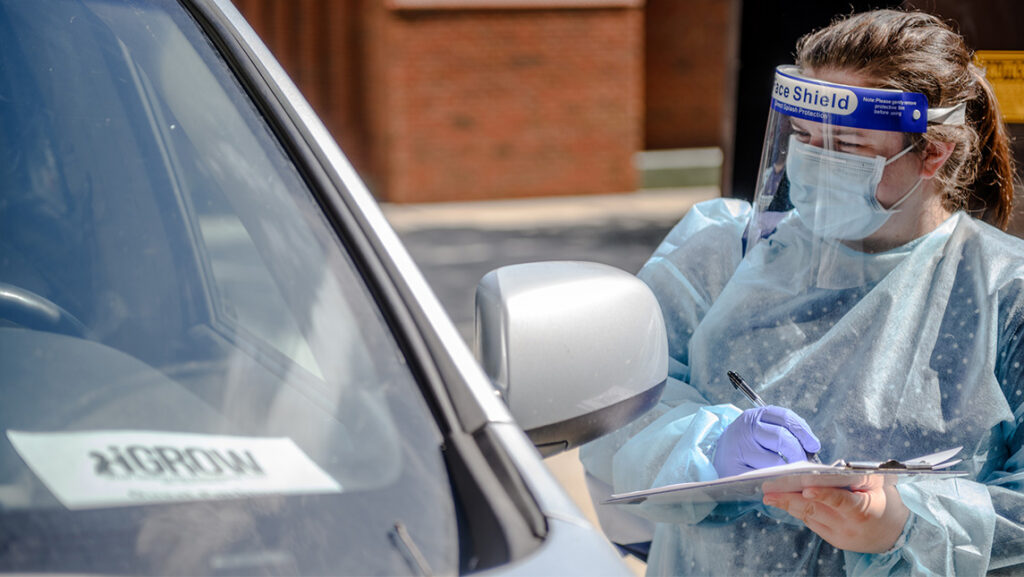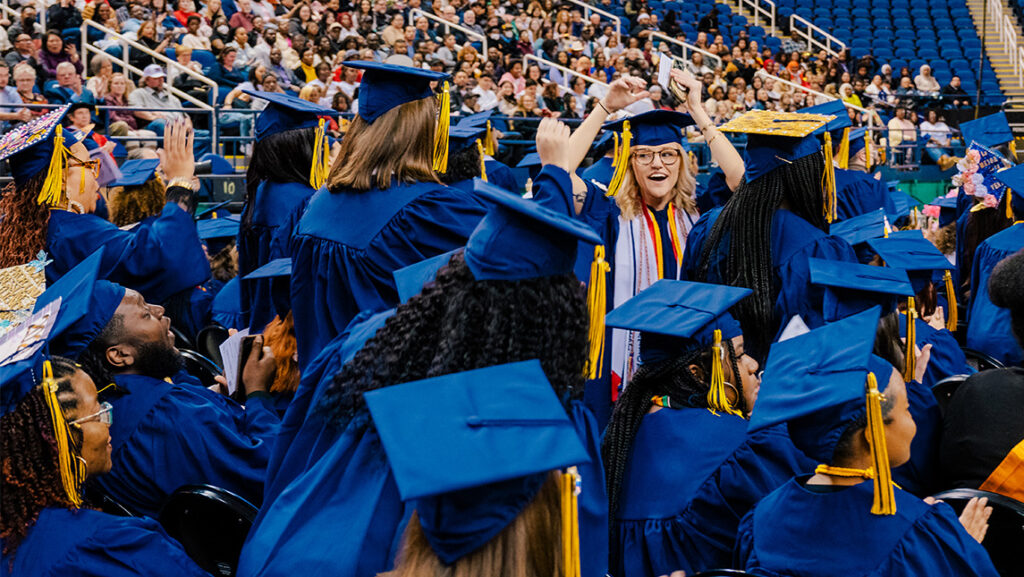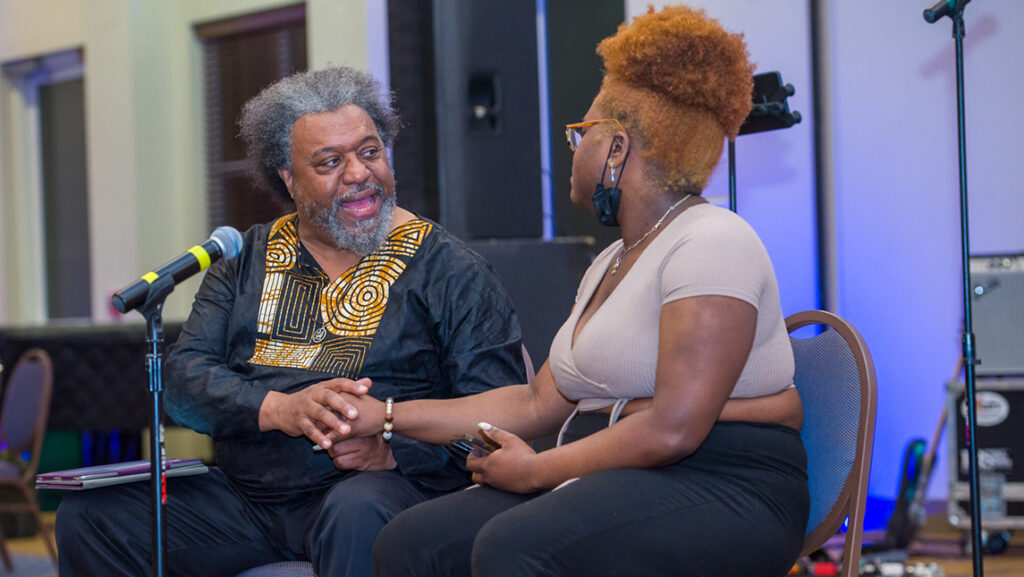
UNC Greensboro has a long tradition of supporting military-affiliated students. For the eleventh consecutive year, UNCG has been named a Military Friendly School by VIQTORY for excellence in supporting military-affiliated students. UNCG is in the Top 10 nationally for Tier 2 institutions (R2), and is one of just four UNC System institutions to receive this distinction.
Currently, UNCG serves more than 1,300 military-affiliated students – a number that includes service members, veterans, and their dependents. UNCG’s Office of Military-Affiliated Services is a one-stop shop that provides programming, mentorship, resources, community, and support for future, current, and past military-affiliated students and their families.
To celebrate Military Appreciation Month, Vice Chancellor for Finance and Administration Bob Shea, a veteran, had a conversation with Daysha Evans, an active service member serving in the United States Navy and a public health education student here at UNCG.
Shea retired in 2007 from the U.S Navy as an accomplished aviator with the rank of O-6 also known as Captain. During his twenty-five years of service he remained worldwide assignable, providing him the opportunity to see almost every crevice of the world.
Evans, a Raleigh native, has been in the Navy for seven years, serving in Virginia Beach, Virginia, Lemoore, California, Naples, Italy, and now, she is currently stationed in The Kingdom of Bahrain.
Read the Q&A:
Shea: How long have you been in Bahrain? How are you adjusting to the weather? I know it’s hot as can be over there.
Evans: I’ve only been here for two months, so I’m pretty new here. It is pretty hot – the sun beams down making it 90 degrees as early as 6 a.m.
Shea: Yeah, Bahrain is headquarters to what the Navy calls Fifth Fleet. So all of the Navy operations in the Middle East and the Persian Gulf report there, making it a very important geopolitical region for the United States and the Navy. How long is your tour?
Evans: Eighteen months.
Shea: And what’s your rating or specialty?
Evans: I am a Yeoman First Class Petty Officer, YN1 for short. My job entails all things administration, drafting letters, legal documents, travel arrangements, planning events such as retirements, Naval ceremonies and more. However, when I joined the Navy, I was an Undesignated Airman. I was attached to VFA-136 during this time where I worked in the line shack as a plane captain for a short time.
Shea: Ah, yes, that’s an F/A-18 squadron. How is your experience here at UNCG helping you in your naval career or vice versa?
Evans: My major is public health education, it doesn’t directly relate to what I’m doing in my current job, it’s what I want to pursue once I get out of the Navy, and the skills that I’m building during my time are setting myself up for a successful career once I do decide to depart.
What drew you to the Navy?
Shea: A lot of different things. When I was seven, my dad took me to the Boston Harbor when the John F. Kennedy carrier made its inaugural cruise, and I was very intrigued by that. I thought, “Hey, I think that’s something I would like to do.” And then when I got into high school, I realized that service was important to me. And probably close to the top of the list of reasons was that it was a way for me to pay for college. I came from a working class family. So I was on my own to pay for college. So the Navy helping to pay for college and for your ROTC scholarship was very appealing to me. Initially, I thought I would do my minimum obligated service, and then I would leave. But I ended up liking it so much that I stayed for 25 years. It’s hard to believe, but my wife and I did it one tour at a time. I started out driving ships, and then I went to flight school. I got married shortly after I got my wings, and then it became a joint decision. With my wife and I, we loved moving around the country. We moved 12 times over the course of my 25 years in the Navy. Like you, I was deployed all over the world – the only place I haven’t been is Australia. So it was a combination of service, idealism, and pragmatism – a way to have college paid for. And I think, to a large extent, that’s what motivates people to serve today. It’s that combination of service and the fact that the Navy and the military in a broader sense invest in their people with tuition assistance, the GI Bill, and giving people the time to pursue a higher education while they’re on active duty like yourself, Daysha.
Evans: You said you drove ships. Did you come into the Navy as a QM, a quartermaster (the person at the helm)?
Shea: No, I came in as a surface warfare officer. I got commissioned as an ensign (O-1) right out of college and then retired 25 years later. I started out as a SWO – I did that on two ships. Then I became an aviator, and flew P-3s, and had command of a P-3 squadron. Then, the Navy sent me to business school, and I became a budget person at the Pentagon. That’s what led to my second career in higher education. I was on the faculty at the Naval War College in Newport, Rhode Island, when I retired from the Navy. I transitioned into higher education within administration and finance but the Navy laid the groundwork for all of that.
Evans: Sounds like an interesting career. What would you say are the best character traits you develop whilst serving that have been beneficial in the civilian world?
Shea: People always tell me, “Boy, the military and higher education seem so different.” And I guess to outsiders, it might appear that way. But they’re really not. Think about what’s at the core of what UNCG does, and what is at the core of what the Navy or any military service does. They take a young adult from disparate locations around the state and the country from all different kinds of socio-economic groups, and they give them training and education. And it’s an opportunity for that individual to grow and accept that challenge, opportunity, and responsibility and blossom into productive citizens. So there are a lot of similarities. The character traits, I think, that everybody in the Navy and across the military is inculcated with is that we all go through that formative time earlier in our careers during bootcamp. That was a shock when you got off that bus, right? And what do they do? They tear everybody down, right? They take away all your individuality, and they build you back together as a team. They foster hard work, teamwork, patriotism, and integrity. And that is the Navy’s core values – honor, courage. and commitment. And those are qualities I still hold today as a finance leader at UNCG. If my credibility is damaged, my value to the chancellor is not very high. So I always have to operate with transparency and tell the truth.
Evans: Can you share some of your fondest memories or stories from the time you served?
Shea: My biggest takeaway from my time in the Navy was the relationships I fostered. I still have those relationships today. My longest and best friends are three guys that I served with in my first squadron, VP-45. We remain friends to this day, and our wives have become great friends, and our kids have become great friends. I’m still in touch via Facebook with my command master chief when I was a training officer in VP-66 and my senior chiefs. A story I will share with you is when I was deployed and my oldest son was born. The commanding officer wouldn’t let me leave. So I missed the birth of my eldest son, but the Executive Officer called me and another guy whose wife was due around the same time as mine and said, “I’m sending you home today.” And to me, that was a sign of real leadership and taking care of your people. He never told me this, but I’m sure he got ripped by the Commanding Officer. But you talk about an organization of 400 people who saw that act, and said, “That guy’s a real leader.” And we were near the end of deployment anyway, so the fact that he let us go home a couple of days early, really had no impact on the mission. But boy, it did have a great impact on morale.
Daysha, how much more time do you have in the military and how many more credits do you have left until you get your UNCG degree?
Evans: At UNCG, I have six more classes remaining, I am scheduled to graduate May of 2024. In the military, my current contract takes me up to 2025, but I intend to reenlist for another term.
What advice would you give a student looking to pursue a military career?
Shea: That’s a great question, and it’s something that I’m passionate about. I’m the chair of our local congresswoman’s service academy selection panel. That’s one way I give back to the community by allowing kids here from thenNorth Carolina sixth congressional district to have the opportunities to go to Annapolis or West Point or the Air Force Academy. I think a solution to all the partisanship in our nation is to have people serve in the military – serve an organization that’s greater than individual goals. It was my experience in the military that we were one big team – it didn’t matter who you were or where you came from. The thing that mattered was the mission, and people came together to achieve that mission. The military isn’t perfect, but it’s an organization that brings people of diverse backgrounds together and forges them into a team. One of the great things about the military is that you can’t be political and it brings people from diverse backgrounds and perspectives together. It’s a great melting pot and way to bring people together. I think that’s the real benefit of serving in the military. And if you don’t want to be in the military, you can join the Peace Corps or AmeriCorps. I believe giving back and serving the nation is great for citizenship and for our democracy.
Story by Alexandra McQueen, University Communications


